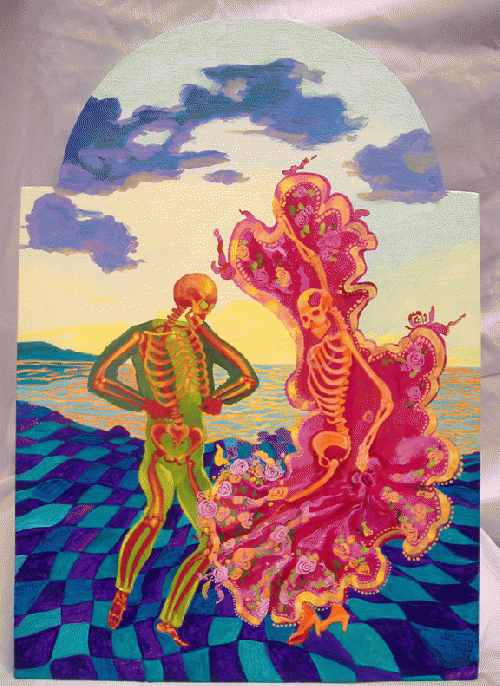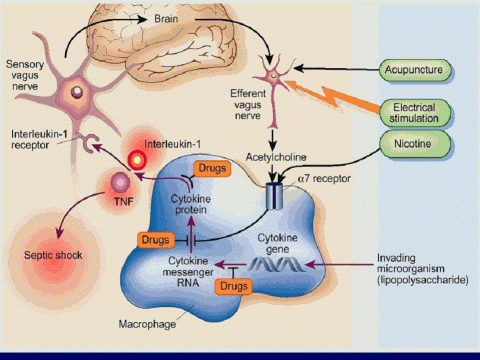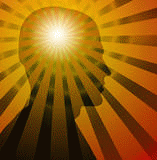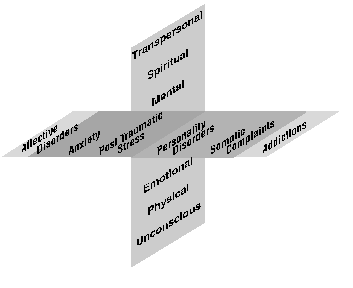 Lewis Mehl-Madrona: Working to Recover, or Adjusting to Illness? Existing research is pessimistic about the value of our currently dominant biomedical paradigm for treating mental illness. Long-term antipsychotic use appears to make people worse rather than better. While the research continues to accumulate, practice does not change. Doctors continue to practice as if psychosis comes from lack of medication. People recover without medications. How do we reconcile these two models? 1 |
Helen Gibbons: The 6 Hour Solution to Work stress
Helen Gibbons, Chief Psychologist and pioneer of Autogenic Training in Australia,discusses the benefits of Autogenic Training in combating work stress, particularly in the Mining and other high risk industries. Developed by German Neuroscientist Dr Schultz, AT is backed by over 3,000 clinical studies worldwide and is used by NASA astronauts to help them adapt to the physical and psycholocial stressors of space travel. 1 |
Frank J. Granett R.ph.: A Mother's Auto-antibodies: Indicator for autism and ADHD
Link between auto-antibodies in mothers and cases of autism and ADHD in children. |
|
Rob Kall: The Hero's Journey and The Biofeedback Neurofeedback Practitioner's and Client's Stories Here's a short summary of my take how story and the Hero's Journey plays an integral role in biofeedback: |
Lewis Mehl-Madrona: NIMH and its Biologic Emphasis
I respond to Dr. Thomas Insel's blog about his views of the top ten advances for mental health for 2012. What saddens me is that all of these advances are heavily biological and that biological medicine hasn't really succeeded very well in improving our mental health. While these advances are very interesting, I argue that what we need is more understanding of how our social relationships form our brains and behavior. 1 |
Lewis Mehl-Madrona: Pain, Part 2
I continue to reflect upon chronic pain, beginning with some comments from my colleague, Peter Blum, who is a hypnotherapist and all around healer-guy in Woodstock, NY, and then leading into some brain science that shows that our brains are changed by the experience of pain and begin to link all kinds of unrelated experiences to that pain so that pain becomes multiply determined by more than just the sensations. |
|
Lewis Mehl-Madrona: Chronic Pain and Opiates
I describe my struggle with prescribing opiates for people in chronic pain. My observation has been that my patients on opiates don't seem to be in any less pain than my patients not on opiates, and sometimes they are more grumpy. I explore the literature and learn that prolonged opiate use sensitizes people to feel more pain and that it can also act as a neurotoxin producing neuropathic-like pain, so perhaps not a good idea |
 Lewis Mehl-Madrona: The Inflammatory Theory of Depression In this article, I describe a way of thinking about depression that makes sense of how we collapse from too much stress and from unremitting anxiety and misery. In this theory, eventually life overwhelms our capacity to resist inflammation and it runs away. From August 16th through the 19th, catch me in Hartford, Connecticut, to further discuss these ideas. For details, see Lewis Mehl-Madrona: The High Cost of Medically Unexplained Symptoms
I write about how the search for the diagnosis for medically unexplained symptoms is an important aspect of what is bankrupting our health care system. We have to solve this problem for manage costs no matter what health care system we have. I acknowledge that some diseases are missed and that some diseases are yet to be found, but suggest that we are much better at findings serious and life threatening illnesses than before. | |
|
Lewis Mehl-Madrona: Day 2 of the Australian Journey 2012
Day 2 of the Australian Journey for 2012 finds me in Melbourne at the International Hearing Voices conference, attended by aboriginal and non-aboriginal people alike. I present the highlights of the conference including aspects of my keynote address. The conference is unique in that it is organized hy voice hearers and not professionals who treat voice hearers. It is also unique in being upbeat, positive, and full of hope. |
 Vijayaraghavan Padmanabhan: When Consciousness Becomes The Basis Of Structure Since the structure-consciousness link can work the other way round, one can postulate that changes in consciousness can produce modifications in the gene structure. 2 |
Joan Brunwasser: Symphony of Science - The Music Video That's Actually Good for You! Symphony of Science is a music video series that remixes the powerful words of influential scientists and makes them sing about their subjects, through the use of auto-tuning techniques. A Glorious Dawn, garnered an unexpected amount of success and praise and amassed a million views in under a month.Since then, I have released nine videos on topics like evolution, the brain, space exploration, the big bang theory, and more. |
|
Lewis Mehl-Madrona: Narrative and Science: Day 13 of the Australian Journey
Today was our last full day in Australia and the occasion for a lecture and series of discussions at the University of Melbourne's Center for International Mental Health and School of Population Health. We explored the bridges between science and the indigenous world view of narrative. Particularly we were impressed with how neuroscience is completely supporting indigenous knowledge about narrative and its importance! |
Judith Acosta: Clingy Children: Signals for Verbal First Aid
Our ability to deal with fear as children is the foundation for the way we deal with fear as adults--both for ourselves and with our kids. Most of us were not raised with these ideas and some of them may feel awkward or even seem unnecessary, especially if we ourselves were dismissed when we were afraid or hurt. |
Lewis Mehl-Madrona: Beyond Narrative Therapy: Day 11 of the Australian Journey
On Day 11, we engaged in dialogue about the narrative therapy of Michael White, which is what most people in Australia and the United States index, when we say narrative practices, and the narrative practices of indigenous people. While we deeply respect Michael White's contributions to psychology and humanity, we present him as one branch on a tree of narrative in which indigenous people live in the trunk and the roots. 1 |
|
Lewis Mehl-Madrona: Implementing Narrative Practices: Day 9 in Australia
The highlight of Day 9 in our Australian cross-cultural mental health journey was a workshop for indigenous mental health and human service providers on how to make their services more indigenous friendly. This involves, of course, conscious decolonization of our clinical practices. We talked about the need to become more narrative, to listen longer and more deeply to the stories people tell us and to hear stories of others. |
Lewis Mehl-Madrona: Imaging and doing are not as different as they sound
Contemporary neuroscience has shown us that imagining an act and performing an act are virtually the same. We can strength our muscles almost as much by imagining exercising as by exercising. If mind is so powerful, why aren't we harnessing it for the good. I fear that mostly we allow it to run for the bad, imagining ourselves in any number of dire straights and illnesses, instead of imagining ourselves hale as we should. 1 |
Lewis Mehl-Madrona: Why Learn Neuroscience?
A student asked me why she needed to know neuroscience. Here is my answer. I argue that science is the new story with which we must contend. If we do not know the contemporary stories of science, they will be used against us. The actual stories being told today about the brain are quite uplifting, full of hope. They include neuroplasticity and epigenetics. If we know these stories we can fight against bad neuroscience. 1 |
|
Hyla Cass: Are Cell Phones and Wi-Fi Hazardous to Your Health?
The latest form of environmental pollution -- and one that industry, government and wireless consumers don't like to acknowledge -- may be the most devastating threat to health yet: electromagnetic fields (EMFs). |
Lewis Mehl-Madrona: NICABM and MInd-Body Medicine
I reflect upon the contributions of the National Institute for the Clinical Advancement of Mind-Body Medicine toward furthering the field. At their upcoming conference this December, prominent are newer ideas of neuroplasticity and chronic pain. Through the understanding that pain circuitry in the brain are remodeled by the experience of pain so as to make people feel more pain, we can refute old ideas of pain. 1 |
Lewis Mehl-Madrona: Walking with Dementia
Unexpectedly I find myself visiting a friend for the weekend who is helping his mother place his father into a long-term care facility. My friend's father has vascular dementia, the result of a series of strokes, each one of which rendering him progressively less capable. Nevertheless, we have a marvelous walk in which he demonstrates the unassailable curiousity of human beings for describing the motivations of others. 1 |
|
Dr. Clare Albright: Neurofeedback in the Treatment of Addiction
Is neurofeedback a helpful adjunct to drug and alcohol rehabilitation treatment? |
Lewis Mehl-Madrona: Why do we need Stories?
Making up story is what are brains do best. In fact, the default mode of the brain is to idly invent what if and if only stories to so that we can run simulations of our social world. We are designed to fill in gaps in our perception. We must reject much environmental information in order to maintain a stable world map. |
Colleen Roberts: The Human Side of Neurofeedback
This article gives an easy to understand description of neurofeedback and how it benefited my niece Suzy Johnson, who suffered from ADHD. 1 |
|
Grant Lawrence: Parapsychology and the Paranormal: The Conspiracy To Deny The Real
Parapsychology only seems extraordinary to those that hold a completely outdated view of reality which happens to be most of science. That view of reality is found in 17th century Newtonian Physics and the mechanistic view of matter and the universe. 1 |
Tom Collura: FLEXIBILITY AND APPROPRIATENESS -AN UNDERPINNING WE CAN ALL AGREE UPON
Flexibility and appropriateness of brain function are put into context, and show up at the core of many applications of neurofeedback. It is not so much an issue of "too much" or "too little" as it is one of the brain having the ability to be flexible and appropriate, to access brain states that are suited to the task or situation. |
Mariella Fischer-Williams, MD, FRCP: The Neurology of Biofeedback; A Neuro-anatomical and Physiological Review
People commonly ask the questions : "Why?", "How does a thing work?" and "How can I fix it?". I do not attempt to answer "Why?" because it is a metaphysical question. Much of this article answers the question of "How can I fix it?".
I shall mainly describe "How does the brain work?" which I freely acknowledge is an immodest goal.
The nervous system is built upon a living network of feedback, constantly adapting |
|
Jon Frederick: The Role of Mind Body Medicine in the Mind-Body Problem
It is commonly claimed that biofeedback increases conscious awareness of physiological processes that are otherwise subconscious. By measuring awareness explicitly, EEG state discrimination paradigms provide a quantitatively rigorous and largely unexplored method of observing the boundaries between consciousness and the brain. |
 Nancy White: Alpha-Theta Neurotherapy As a Multi-Level Matrix of Intervention Alpha-Theta Neurotherapy, has been found in clinical practice, as in the original work of Elmer and Alyce Green and further developed by Eugene Peniston and described in his original research, to reduce or eliminate alcoholic craving while simultaneously addressing mental, emotional, physical and, at times, spiritual dimensions of alcoholism and surrounding issues. |
Laura L. Whittemore: The Process of Recovery; from mild traumatic brain injury (MTBI) To some, the word "recovery" means getting better, regaining what you lost, the pain goes away and the brain is as sharp and attentive as it was before the accident. However, every brain injury is as varied as the recovery process because of the uniqueness of who you are. A brain injury is unlike all other injuries. |

|
Articles For Tag "Brain" |
